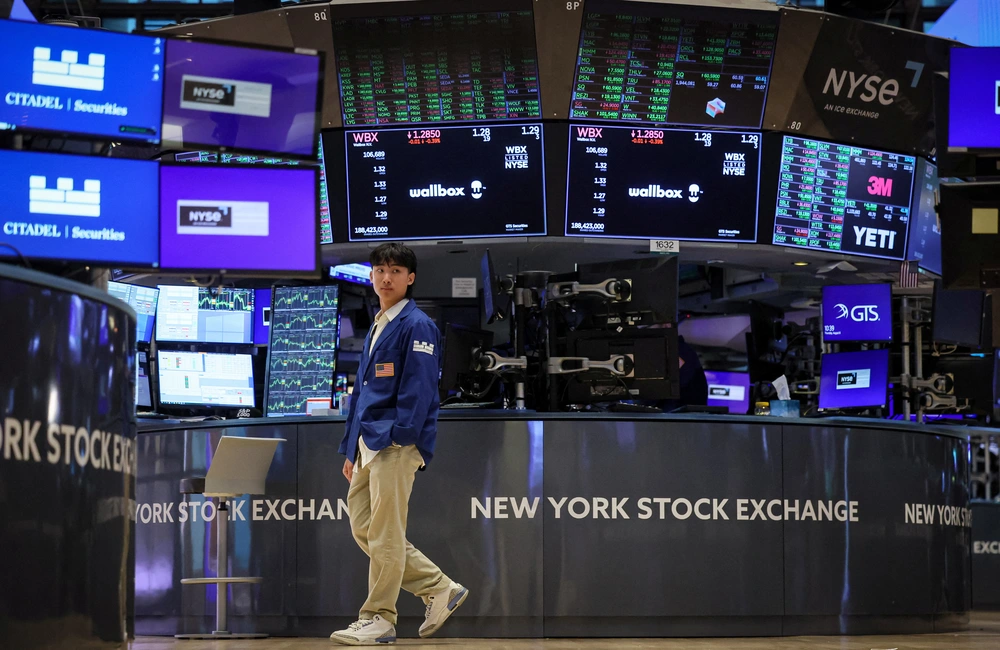ASX futures were 59 points or 0.8% in the red as of 8:00am Saturday, suggesting Australian shares will open lower following last week’s decline for US equities.
US stocks pulled back Friday, on pace for their worst weekly performance of the year, as hot economic data have rekindled worries about restrictive Federal Reserve policy.
The S&P 500 and the Dow Jones Industrial Average fell 1%, while the technology-heavy Nasdaq Composite dropped 1.7%. All three indices dropped more than 2% last week.
The losses are the latest in a turbulent stretch for the market. The major indices climbed to start 2023, with many investors betting that moderating inflation could lead the Fed to cut interest rates later this year, but the outlook has muddied in recent weeks.
Investors' enthusiasm has quickly waned after a string of reports have indicated the US is seeing stickier-than-expected inflation and a resilient economy, keeping the door open for the Fed to maintain aggressive monetary-tightening measures to cool price pressures.
In commodity markets, Brent crude oil added 1.34% to $US83.31 a barrel while gold shed 0.52% to US$1,812.82.
Australian government bonds dipped lower, with the 2 Year yield down to 3.55% and the 10 Year slipping to 3.82%. Yields on US Treasury notes increased, as the 2 Year jumped to 4.80% and the 10 Year climbed to 3.94%.
The Australian dollar slid to 67.28 US cents from its previous close of 68.05. The Wall Street Journal Dollar Index, which tracks the US dollar against 16 other currencies, edged up to 98.15.
Asia
Chinese shares extended early losses to close lower amid worries over China-US relations following news the US plans to increase the number of troops deployed to Taiwan. The benchmark Shanghai Composite Index fell 0.6% to 3267.16 and the Shenzhen Composite Index declined 0.7% to 2140.65, while the ChiNext Price Index dropped 1.2% to 2428.94. Chinese liquor stocks were lower, with Kweichow Moutai off 1.7% and Wuliangye Yibin falling 2.0%. Focus will likely be on China's official February manufacturing and non-manufacturing PMI data, which are due next week. Developments relating to the Russia-Ukraine war will also be closely watched after China made a fresh call for a cease-fire and peace talks to end the war.
Hong Kong's Hang Seng Index fell 1.7% to 20010.04, marking its lowest closing level since the end of December and its fourth straight weekly decline. Investors were looking toward the release Friday evening of the US core PCE price index. Market participants will not want to see US price pressures begin to edge higher again, given how fragile equity markets are currently looking, said Michael Hewson, chief market analyst at CMC Markets. Tech companies led losses on the benchmark HSI. NetEase slid 11%, Alibaba Group slipped 5.4% and JD.com was down 4.75%. The Hang Seng Tech Index dropped 3.3% to close at 4010.66.
Japanese stocks ended higher, led by semiconductor-related shares, as fears eased about potential policy tightening by the Bank of Japan. Advantest gained 8.2% and Tokyo Electron jumped 7.1%. Kazuo Ueda, the nominee for the next BOJ governor, said he did not think the relatively high inflation rate would last and added the central bank should continue its loose monetary policy. The Nikkei Stock Average rose 1.3% to close at 27453.48.
In India, the Sensex fell 0.2% to close at 59463.93, dragged by auto stocks. Stephen Innes, managing partner at SPI Asset Management, said investors were likely adopting a cautious stance ahead of Friday’s US core PCE inflation data. The worst performers on the benchmark index were auto makers Mahindra & Mahindra, which slipped 2.4%, Tata Motors, which dropped 1.3%, and Maruti Suzuki India, which was 1.0% lower. Meanwhile, Asian Paints (India) rose 1.2% and Bajaj Finserv was 0.8% higher.
Europe
European stocks fell as an acceleration in a key US inflation measure fueled expectations for further interest rate rises. The pan-European Stoxx Europe 600 dropped 1%, the German DAX slipped 1.7% and the French CAC 40 fell 1.8%. In Great Britain, the FTSE 100 closed down 0.4%.
The US core personal consumption expenditure's price index (PCE), the Federal Reserve's preferred inflation measure, rose 4.7% year-on-year in January after a 4.4% increase in December. The data boosted market pricing of a 50 basis-point rate hike at the Fed's March meeting, IG analyst Chris Beauchamp wrote. "Perhaps more worrying than a slightly higher [peak] rate is the sticky nature of inflation, with yesterday's pricing for a first rate cut in December 2023 now delayed into 2024."
North America
US stocks pulled back Friday, on pace for their worst weekly performance of the year, as hot economic data have rekindled worries about restrictive Federal Reserve policy.
The S&P 500 and the Dow Jones Industrial Average fell 1%, while the technology-heavy Nasdaq Composite dropped 1.7%. All three indices have dropped more than 2% in the holiday-shortened week.
The losses are the latest in a turbulent stretch for the market. The major indices climbed to start 2023, with many investors betting that moderating inflation could lead the Fed to cut interest rates later this year, but the outlook has muddied in recent weeks.
Investors' enthusiasm has quickly waned after a string of reports have indicated the US is seeing stickier-than-expected inflation and a resilient economy, keeping the door open for the Fed to maintain aggressive monetary-tightening measures to cool price pressures.
"The market is recalibrating and acknowledging that the path toward price stability is fraught with obstacles," said Quincy Krosby, chief global strategist for LPL Financial. "The market is telling us to be careful, with a Fed that has to vanquish inflation and hurt the economy to do it."
Adding to those worries on Friday was January's personal-consumption-expenditures price index (PCE), which overshot economists' expectations. The core reading, which excludes food and energy and is considered the Fed's preferred gauge of inflation, rose 4.7% year on year. That was ahead of consensus forecasts for a 4.4% increase.
Federal-funds futures, used by traders to wager on the course of interest rates, reflected bets that the central bank will bring interest rates significantly higher than most investors expected a month ago.
"The perception of monetary policy and where it's headed has changed dramatically," said David Donabedian, chief investment officer at CIBC Private Wealth US. "What's currently priced in today is more realistic versus what people were pricing in right after the Fed meeting" ending Feb. 1, he said.
Boeing Co. led decliners in the Dow on Friday, with its stock falling 4.2% after the airplane manufacturer halted deliveries of 787 Dreamliner jets because of a documentation issue.
Warner Bros. Discovery Inc. shares retreated 1.8% after the entertainment giant's quarterly revenue missed expectations and its chief executive warned that the US advertising market remains very challenging.
Shares of Carvana Co. dropped 18% after the online used-car seller reported a wider-than-expected quarterly loss and sales that missed analysts' estimates.






















